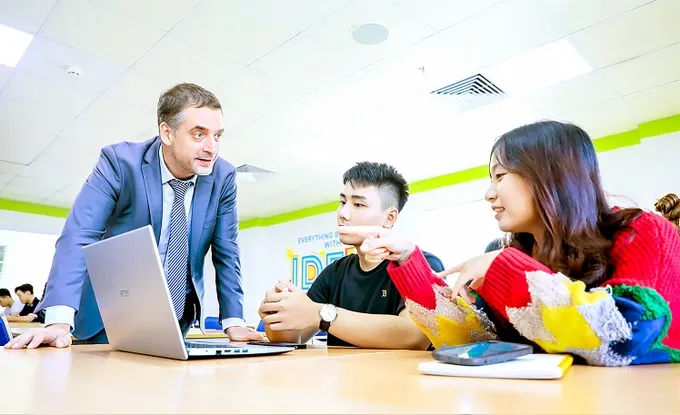
To ensure the effectiveness and smooth implementation of this policy, it is essential that, alongside adjustments made by the State, higher education institutions develop a clear strategy that emphasizes industries and fields where they possess strengths.
Vietnam National University (VNU) Ho Chi Minh City has established a visiting professor program designed to attract leading experts in 12 priority areas. Successful candidates will be appointed by the VNU-HCM Director to a part-time position, with responsibilities including teaching and conducting research. The program offers flexibility, allowing for contributions to be made in person or remotely.
According to Dr. Le Thi Anh Tram, Head of the Organization and Personnel Department of VNU Ho Chi Minh City, the program aims to attract and promote cooperation with outstanding experts and scientists in the world, contributing to improving the quality of teaching and research at VNU Ho Chi Minh City.
The program will have 100 visiting professors between 2025 and 2030, with 50 visiting professors set to be invited from 2025 and 2026 alone.
Participation in the program is extended to distinguished individuals, including professors, associate professors, experts, scientists, and managers who have demonstrated exceptional accomplishments. These participants are currently affiliated with universities, research institutions, international organizations, and technology companies globally.
Applicants should possess a distinguished record of accomplishment in teaching, research, and technology transfer, substantiated by international publications, patents, and developed technologies.
VNU-Hanoi has also established a program to attract outstanding scientists, both Vietnamese and international including those in the diaspora and foreign nationals, who have demonstrated significant research achievements. This program offers the opportunity to lead research teams within VNU-Hanoi's priority science and technology areas. Participating scientists will receive VND3 billion in research funding over a three-year period.
Many other universities such as Ho Chi Minh City University of Finance and Marketing, Ho Chi Minh City University of Economics, Van Lang University, Nguyen Tat Thanh University, Ho Chi Minh City University of Banking currently have many foreign lecturers and experts participating in teaching.
These schools offer many attractive policies to attract lecturers and experts such as high salaries and teaching remuneration. In case of becoming permanent lecturers, they will receive a bonus of hundreds of millions of Vietnamese dong, attractive mechanisms when implementing projects and scientific research topics.
Ministries attempt to remove bottlenecks
Currently, foreign lecturers and experts working at Vietnamese universities must comply with the Government’s Decree 152/2020/ND-CP regulating foreigners working in Vietnam and recruiting and managing Vietnamese employees working for foreign organizations and individuals in Vietnam and Decree 70/2023/ND-CP on amending and supplementing Decree 152.
According to the present regulations, foreign lecturers at universities must now submit work permit applications to the Department of Employment, Ministry of Labor, Invalids and Social Affairs, instead of the previous Department of Labor, Invalids and Social Affairs.
Speaking at a recent conference of the Council of Rectors of universities in Ho Chi Minh City, Associate Professor Vo Thi Ngoc Thuy, Rector of Hoa Sen University, shared that the demand for recruiting and using foreign lecturers and foreign experts to improve the quality of training and scientific research is quite huge.
Current regulations impose a cumbersome reporting and approval process for foreign labor recruitment, often taking up to five months. This lengthy process significantly increases administrative burden for schools.
Professor Nguyen Thanh Phuong, Chairman of the Council of Can Tho University, shared a comparable experience regarding challenges faced. He cited the case of a Japanese expert at Can Tho University who managed all aspects of his transition to Vietnam, including the provision of research funding.
The school had no choice but to take the Japanese expert to Cambodia every three months to stamp his exit and re-enter the country, as his application for a 1-year work permit was unsuccessful. Professor Phuong stated that visa and work permit regulations must be more open to attract a team of experts.
According to Associate Professor Vu Hai Quan, Director of VNU-HCM, in order to urgently implement Resolution 57-NQ/TW on breakthroughs in science and technology development, innovation and national digital transformation, VNU-HCM will implement a visiting professor program, starting recruitment from March 2025.
With Resolutions 57 and Resolutions 03/NQ-CP issued on January 9, 2025, the Government is expected to revise regulations to facilitate key tasks for higher education institutions, including faculty development, research enhancement, industry collaboration, digital transformation, and investment in infrastructure and innovation ecosystems.
The Prime Minister's Decision No. 1600/QD-TTg (December 19, 2024) approved the Project on International Integration in Education and Training by 2030.
The project sets forth key objectives for enhancing international cooperation in education and training by 2030. It including at least 20 percent of joint training programs with foreign institutions will feature disciplines from universities ranked among the world’s top 500.
Moreover, the proportion of international students pursuing degree programs in Vietnam will increase to 1.5 percent and the combined percentage of Vietnamese lecturers engaging in academic exchanges abroad and foreign lecturers teaching, researching, and collaborating in Vietnam will reach 8 percent of the total Vietnamese faculty.
Last but not least, over 20 percent of training programs will meet the quality accreditation standards of prestigious international accreditation organizations.
























